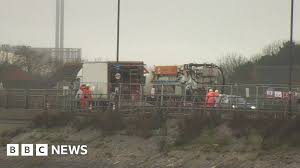Liz Truss's certifiable bat skit

If you time-travelled to the late summer of 2022 and told incoming Prime Minister Liz Truss she would have a book out within twenty months, her response would likely have included an expletive, an exclamation mark and a question mark.
But things happened, quite quickly, and Truss, now former UK prime minister, has published a new book.
FT Alphaville last caught up with Truss’s personal journey last February, after she published a near-4,000-word essay in the Sunday Telegraph, a fanzine.
We wrote then that Truss was
firmly in the gentle foothills of a stabbed-in-the-back (/front?) theory
with regards to her time as PM: blaming almost everyone but herself for a catastrophic 49-day period in office.
What’s changed since then? Not much. While her politically inept successor Rishi Sunak clings on thanks more to statutory law than political skill, Truss has been on a global tour. She’s aligned herself to the Trumpist right in the US, and penned ‘Ten Years to Save the West’ — effectively a 100,000-word extrapolation of the essay’s arguments — which was published today.
The media tour is well under way, already producing headlines like “Truss supports Trump” and “Truss thinks UN should be abolished”, and quotes from the lady herself such as:
Sometimes I don’t always communicate in a most clear way
Alphaville got its hands on a copy of the book, hoping to find some interesting financial things to talk about. We did not. So what is there to say?
The easy thing, of course, is to point out the hypocrisy. For instance, in the introduction, Truss writes:
[Our] political discourse is often fundamentally unserious, obsessing over trivialities and more concerned with personalities than with ideas. It is often the media that gets blamed for that, but the bigger problem is with the many politicians who buy into that agenda and willingly play the game. The result is a political establishment driven by short-term popularity, drifting on the prevailing winds of fashionable commentary…
…and then goes on to include a chapter titled “Liberty, Equality and Wokery”. On the topic of which:
The West has lost its way. We need to wake up and meet the challenges before us or we will lose.
Is Truss saying the West needs to ‘get woke?’.
Or
we have seen the role and size of the state increase
…from the PM who did this.
Occasionally, Truss drifts perilously close to epiphany, such as when writing about her time as a junior minister in the Department for Education under David Cameron:
Before being asked to join the government, I had set out in a series of think-tank pamphlets how, by removing regulations and upping our standards, we could transform the system. This only showed the danger of writing pamphlets: real life is much messier.
And yet.
We could go on and on and on (trust us), but Alphaville is a markets, economics and finance blog, not a political one. So let’s quickly address the economic issue here.
Truss likes to say that her focus is on growth. It’s not a super controversial ambition.
Unfortunately, her approach worked a bit like this: imagine a bunch of people are stuck in a warm, stuffy room together. Everyone wants the windows to be opened, but they are fastened shut by complicated locks. While people try to work out how the locks operate, one of them, Liz, attempts to throw a chair through the window. The chair bounces off and hits her in the face.
As we wrote before the mini-Budget, this is an issue of Truss and her political tribe reaching directionally correct answers despite abject failures of understanding along the way.
No section of ‘Ten Years to Save the West’ demonstrates this better than one from the book’s second chapter, titled “A Hostile Environment” (interpolating the Home Office’s systematically racist, family-destroying immigration policies into a climate pun, cute! ????).
Here, Truss rails against green stuff (the climate kind, not Kneadatite) like the cost of environmental regulations and corporate ‘virtue signalling’, which she sees as a Trojan horse for socialism, gravy trains and badger supremacy.
She writes about one of her campaigns as constituency MP for South West Norfolk, for a “major expansion” of the A11 road:
The project had been hugely delayed and the price massively hiked by all the environmental objections and works. In particular, the builders had been forced to install ‘bat bridges’ so bats could travel safely across the road.
Yes, the A11 has ‘bat bridges’. Here’s an example (from Cornwall) of how such a bridge looks:

Bats operate like blind flying Scalextric, following along natural features such as hedgerows and the perimeter of woodlands by sonar, in order to commute to areas like feeding spots.
So the fundamental ambition behind bat bridges seems reasonably solid: if you’re going to build a road cutting through the bats’ commute (a process known as severance), you want to find a way to minimise the interruption.
You may also, of course, want to avoid having bats be killed by traffic — although studies have found that it’s hard to monitor how many bats are killed on the roads because of their small size and suitability as a snack to go for larger predators.
So, in theory, creating a raised bridge is the solution. The suspended lines attempt to provide continuity between the natural lines that the bats normally follow, linking them up across roads by providing a continued reference for sonar navigation.
The problem is the bats don’t use them — bat bridges are now considered so unsuccessful that The Observer called them one of “nature conservation’s epic fails” earlier this year.
In the case of the Broadland Northway in Norfolk (near to, but not in, Truss’s constituency), slightly fewer than half of the bats observed flew close enough to the bridges to be considered users (from Appendix A here);
There was minimal difference between the numbers of bats using the gantry with the 5m classification and not using the gantry (48%, 52%) illustrating that approximately half of the crossing bats were using that gantries.
(The report notes, encouragingly, that low light levels during the monitoring mean some bats may have been missed.)
It’s an unfortunate error, and an expensive one — six bridges over the A11 between Barton Mills in Suffolk and Thetford in Norfolk cost £350k according to local reporting — that seems to vindicate Truss’s no-nonsense, spend-smart philosophy.
Unfortunately, she goes on to write:
Needless to say, no bat has ever been seen on these bridges. Anyway, bats fly!
Wha… what?
— Does Liz Truss think bats were supposed to physically climb the bridges?— Does she think environmental experts believed bats normally land next to roads and then walk across them?— Does she think that if the solution was for bats to simply fly over, nobody else would have thought of that?— Knowing this now, do you think Truss would be able to observe certain parallels between how she got this issue basically right despite totally misunderstanding the problem, and how she got her ambitions as PM basically right despite totally misunderstanding the problem?— Do you think Truss thinks much at all?
If your answer to that last question is, no, incidentally, you’d be wrong. In fact, in the book’s 11th chapter, she reveals chiropteran philosophy is actually a key concern:
I am someone who likes to shoot the breeze and bat ideas back and forth, but as Prime Minister there was precious little opportunity to do that, even if I could have found the time.


 United Kingdom
United Kingdom Argentina
Argentina  Australia
Australia  Austria
Austria  Brazil
Brazil  Canada
Canada  Germany
Germany  Ireland
Ireland  Italy
Italy  Malaysia
Malaysia  Mexico
Mexico  New Zealand
New Zealand  Poland
Poland  South Africa
South Africa  United States
United States 























